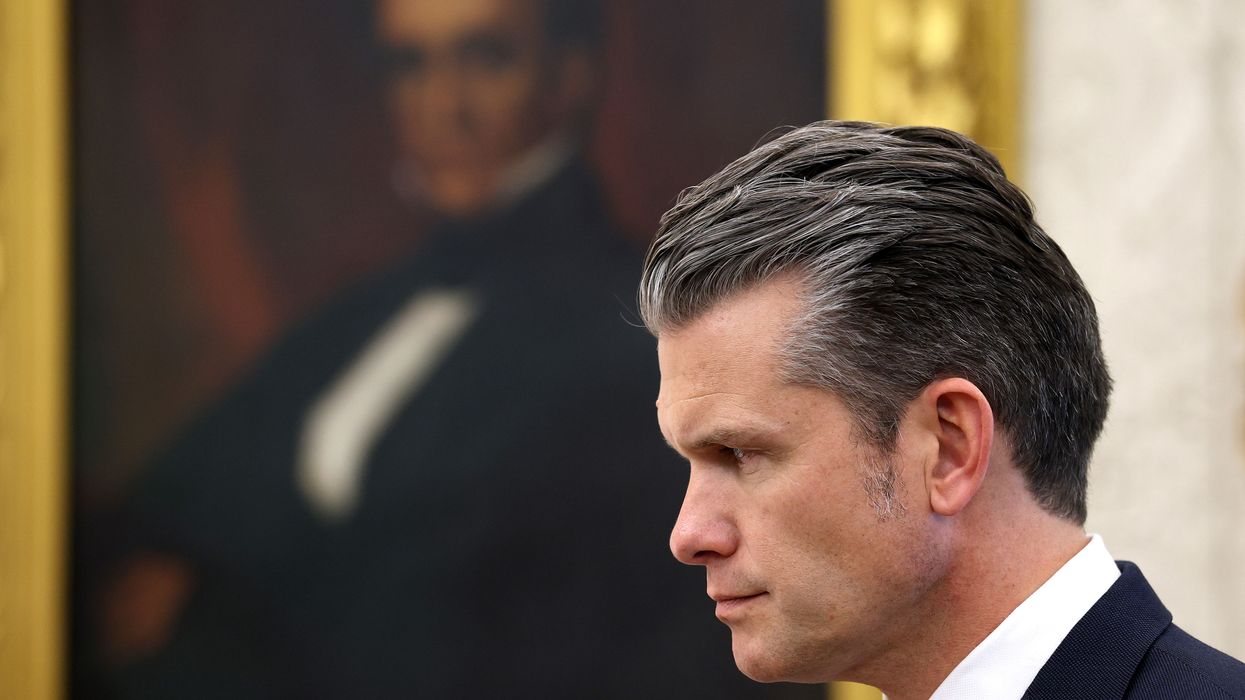The Post reported for the first time on the directive Hegseth gave to Special Operations commanders as intelligence analysts reported that their surveillance had confirmed the 11 people aboard the boat were carrying drugs to the US—an alleged crime that, in the past and in accordance with international law, would have prompted US agencies to intercept the vessel, confiscate any illegal substances that were found, and arrest those on board.
But as the Trump administration began its boat bombing campaign, the order Hegseth gave "was to kill everybody," one of the intelligence analysts told the Post.
After the first missile strike, the officials realized that two of the passengers had survived the blast—prompting a Special Operations commander to initiate a second strike to comply with Hegseth's order.
The Former JAGs Working Group, which was established in February in response to Hegseth's firing of Army and Air Force JAGs, said that the dismissal of the military's top legal advisers set the stage for the defense secretary's order and the continued bombing of boats in the Caribbean and the eastern Pacific, which have now killed more than 80 people.
Hegseth's "systematic dismantling of the military’s legal guardrails" led to the formation of the working group, pointed out the former JAGs. "Had those guardrails been in place, we are confident they would have prevented these crimes."
The working group said Hegseth's order to "kill everybody" could be understood in one of two ways—a demand for the US military to carry out a clear war crime, or for those involved in the operation to commit murder:
If the US military operation to interdict and destroy suspected narcotrafficking vessels is a “non-international armed conflict,” as the Trump administration suggests, orders to “kill everybody,” which can reasonably be regarded as an order to give “no quarter,” and to “double-tap” a target in order to kill survivors, are clearly illegal under international law. In short, they are war crimes.
If the US military operation is not an armed conflict of any kind, these orders to kill helpless civilians clinging to the wreckage of a vessel our military destroyed would subject everyone from [the defense secretary] down to the individual who pulled the trigger to prosecution under US law for murder.
The Post's reporting comes less than two weeks after NBC News revealed that Senior Judge Advocate General (JAG) Paul Meagher, a Marine colonel at US Southern Command (SOUTHCOM) in Miami, had spoken out against the plans to begin bombing boats in the Caribbean, specifically warning in August that the operations would make service members liable for extrajudicial killing.
Following the Post's report, Republican-controlled House and Senate committees said they were investigating the allegations regarding Hegseth's order, which the defense secretary dismissed on Friday as "fabricated, inflammatory, and derogatory reporting."
Senate Armed Services Committee Chair Roger Wicker (R-Miss.), joined by Ranking Member Jack Reed (D-RI), said they had "directed inquiries to the Department [of Defense]," and would "be conducting vigorous oversight to determine the facts related to these circumstances.”
Reps. Mike Rogers (R-Ala.) and Adam Smith (D-Wash.), chair and ranking member of the House Armed Services Committee, released a similar statement.
The administration has never publicly released evidence that the dozens of people it's killed in the Caribbean and eastern Pacific were drug traffickers. The Associated Press reported on the identities of some of the victims, finding among them an out-of-work bus driver and a fisherman who had agreed to help ferry narcotics—which led one policy expert to liken the boat-bombing operations to "straight-up massacring 16-year-old drug dealers on US street corners."
President Donald Trump has told Congress—where lawmakers from both sides of the aisle have unsuccessfully sought to block further military action in the Caribbean and Venezuela—that the US is engaged in an "armed conflict" with drug cartels in the South American country. The Former JAGs Working Group suggested that Trump's claims about the operation are immaterial considering Hegeth's reported order for US officers to "kill everybody" on September 2.
"Regardless of whether the US is involved in an armed conflict, law enforcement operations, or any other application of military force, international and domestic US law prohibit the intentional targeting of defenseless persons," said the former military lawyers. "If the Washington Post and CNN reports are true, the two survivors of the September, 2 2025 US attack against a vessel carrying 11 persons were rendered unable to continue their mission when US military forces significantly damaged the vessel carrying them. Under such circumstances, not only does international law prohibit targeting these survivors, but it also requires the attacking force to protect, rescue, and, if applicable, treat them as prisoners of war. Violations of these obligations are war crimes, murder, or both. There are no other options."
The Joint Special Operations Command previously told the White House that the "double-tap" strike was necessary to sink the boat to avoid a "navigation hazard" to other vessels—a claim that Rep. Seth Moulton (D-Mass.), a Marine Corps veteran, called "patently absurd."
"Mark my words: It may take some time, but Americans will be prosecuted for this, either as a war crime or outright murder," Moulton told the Post.
Writer Ramez Naam said Saturday that Hegseth "telegraphed his intent to issue illegal orders the day he fired the JAGs," when he told the press that the legal advisers had been dismissed to avoid “roadblocks to orders that are given by a commander in chief."
The former JAGs called on Congress to investigate the new reporting on Hegseth's order "and the American people to oppose any use of the US military that involves the intentional targeting of anyone—enemy combatants, non-combatants, or civilians—rendered hors de combat (“out of the fight”) as a result of their wounds or the destruction of the ship or aircraft carrying them."
"We also advise our fellow citizens that orders like those described above are the kinds of 'patently illegal orders' all military members have a duty to disobey," they said.
The reporting on Hegseth's order came ahead of Trump's latest escalation with Venezuela, with the president claiming he had ordered the airspace above and around the South American country closed—an action Venezuela's government denounced as an "extravagant, illegal, and unjustified aggression" and a "colonialist threat."
While the administration has repeatedly claimed its actions in Venezuela—including the boat strikes, an authorized CIA operation, and discussions about potential strikes inside the country—are aimed at dismantling drug trafficking operations there, US and international intelligence assessments have not pointed to Venezuela as a major source of drugs that enter the United States.
Meanwhile, Trump on Friday announced his plan to pardon former Honduran President Juan Orlando Hernández, who was convicted by a US jury of conspiring to traffic more than 400 tons of cocaine and who once said he wanted to “stuff the drugs right up the noses of the gringos.”
The president publicly stated in 2023 that had he won the 2020 election, he would have taken control of Venezuela's oil reserves.
Sen. Chris Van Hollen (D-Md.) said the new reporting on Hegseth's order made even clearer that the boat bombings have been "extrajudicial killings."
"Hegseth needs to be held accountable," said the senator. "What’s more, Trump promised the American people no new wars but is now manufacturing this conflict and lying about his motives. This warmongering has got to stop."




